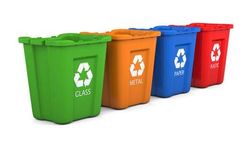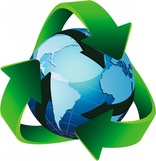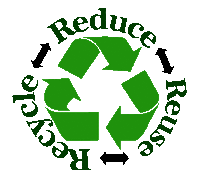|
Reduce. Reuse. Recycle! That was the mantra that became the battle cry of the environmental revolution a few decades ago. It was in television commercials, printed on paper bags and emblazoned on common paraphernalia. There were even public service announcements emphasizing the phrase in children’s TV programs like “Captain Planet.” Thanks to efforts such as the annual “Earth Day” observance beginning in 1970, the 1979 passing of the Resource Recovery Act, the founding of the EPA in 1980, and the “Three R’s” mantra, most Americans today have at least some level of awareness about earth conservation efforts. I would even venture to say that most people make some conscious effort to participate in these efforts, such as choosing to place a plastic water bottle in the recycling receptacle instead of the trash can while waiting to board a flight at the airport. It is a good thing that a baseline environmental awareness level has been established about small things that we can all do to preserve our planet. But that baseline is clearly not enough! I recently attended the Fall National Meeting of the American Chemical Society in Philadelphia, and I noticed something a bit surprising. At each National Meeting there is an Exposition, which is a large event featuring scores of vendors and companies who showcase their products to the conference attendees. At the opening of the Exposition there were small snacks, drinks and desserts served. Naturally these light refreshments were served on common plastic plates with plastic utensils and paper napkins. Upon finishing my treats, I ventured to the trash (to dispose of my plate and utensils) where I noticed two large waste receptacles; one was blue and labelled for recycling, and the other was black and was labelled ‘landfill.’ To my dismay, each container essentially became ‘trash,’ because the same waste items were present in each receptacle in roughly equivalent amounts. This was disappointing. I thought to myself, if the chemists – many of whom signed a ‘green’ pledge at this very conference – if they don’t know what is recyclable and what isn’t, then who does?  And to be sure, I’ve definitely seen similar behavior in other public spaces in which both trash and recycling receptacles are present. Almost without fail, both receptacles are full of the same types of materials and are indistinguishable from each other apart from the label and/or the color on the exterior of the container. In order to fix this, I think we need further, ‘yell it from the mountaintop’ awareness and education about what, where and how we can recycle the many things that often wrongly end up in the garbage. Because of those earlier efforts I mentioned, some things are commonly known to be recyclable. This list includes brown paper bags, soda bottles, white printer paper, soup cans, newspaper and glass beverage containers. We all know those things are recyclable, and indeed many people make an effort to place such items in the appropriate container so that they can be properly recycled. But as I peered into the trash and recycling receptacles at the ACS Exposition, I began to question my own understanding of what is recyclable and what is not. Those plastic forks we used to eat with…are they recyclable? What about those black plastic plates we ate on? Are they recyclable? Wait, wait, wait, wait, wait!!! The napkins that I used to wipe my mouth and hands with that are now covered in whip cream, frosting, maraschino cherry juice and chocolate. Can I recycle them…in that condition?? In the ensuing days my thinking and questions began to expand… What about the wrapper that the gummy worms at the gas station convenience store come in; the ones that are sealed by a paper label, adhesive and staples at the top. Is that wrapper recyclable? If so, do I need to painfully remove the adhesive bound paper labeling and/or the staple?? What about the burrito wrapper that I ate from today that appears to be aluminum (a metal) on the exterior, but paper on the interior? Can I recycle that?? And I always wash and recycle plastic bottles that had food in them (e.g. strawberry jelly, salad dressing), but what about those household cleaning product containers that can be clear transparent, white, or a combination of colors (e.g. toilet boil cleaner, scratch removers, glass cleaner)…can I recycle those? How about the paper that my snail mail comes in that has a plastic see-through window where my address appears? Can I recycle that…how?? How about all that plastic that encases my deodorant; I’ve always just thrown those away once the deodorant was used up. Should I be recycling that too? Then there are spray cans, ranging in use from bug spray to cooking oil to air fresheners. What in the world do I do with them once the spray has been used up? How about used light bulbs, expended batteries, old cell phones and computers???? Overwhelming, you say? Agreed. And I know I’m not the only one with these questions…I’ve seen what people put in the recycling receptacle. My concern is that certainly some of the things I mentioned above can be recycled, while others may not be. My suspicion is that some of the items that could and should be recycled aren’t being recycled in part because the infrastructure to do so does not exist. Developing such an infrastructure requires research which costs time and money. This is a consideration that large companies and government entities are typically unwilling to seriously entertain without significant public outcry.  But we need to have a much deeper dialogue about options to improve our recycling practices, and then take the necessary steps to implement them. This will require a significant amount of education for the general public about exactly what can or can’t be recycled. It will also require a commitment by the government and large corporations to research better ways to provide consumers with products that can be recycled. We are long overdue for a nationwide recycling evaluation, because we definitely need to raise that baseline awareness bar concerning recycling. We can do much better! -Dr. Boyd, The Chemist
0 Comments
Your comment will be posted after it is approved.
Leave a Reply. |
Scientific Food For Thought by Dr. Boyd Archives
April 2020
Categories |


 RSS Feed
RSS Feed